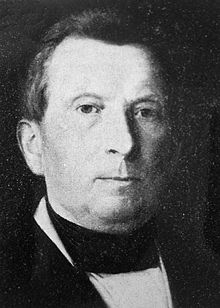Friedrich Wilhelm Stohlmann
Friedrich Wilhelm Stohlmann (born February 16, 1803 in Gütersloh ; † November 6, 1886 there ) was a German doctor, local politician and meteorologist .
After an apprenticeship as a pharmacist in Schildesche , Stohlmann studied medicine in Berlin, where he received his doctorate in 1832 . In 1834 he established himself as a doctor in his hometown of Gütersloh. In 1861 he was appointed to the Medical Council and in 1882 to the 50th anniversary of his career as the Secret Medical Council. From 1862 he was the head physician of the newly founded Evangelical Hospital in Gütersloh. Stohlmann was politically committed to the liberal faction in the city council of Gütersloh.
Stohlmann became known beyond the local sphere of activity through his meteorological observations. Stohlmann was friends with Alexander von Humboldt and exchanged ideas with him about the establishment of a meteorological observation network in Germany with a central evaluation point. The correspondence preserved in the Gütersloh city archive resulted in the establishment of the Prussian Meteorological Institute in Berlin (today part of the Free University of Berlin ) and the refurbishment of the weather station at Stohlmann's house, which had been in existence since 1835 . In Gütersloh there was one of the 29 official Prussian weather stations. In 1861, Stohlmann published the results of his observations in the text "About the climatic conditions in Güterslohs and Westphalia, " which earned him great recognition. Stohlmann also recorded finds and observations in connection with the meteorite impact of 1851 in Gütersloh.
Stohlmann's daughter Adele (1838–1927) continued her father's weather records until 1922. In the Gütersloh City Museum , electronically presented historical weather data reminds of Stohlmann's lifetime achievement.
Honors
- In 1871 Stohlmann was awarded the Order of the Crown, IVth Class, with the Cross of St. John for the treatment of wounded from the Franco-German War .
- In 1882 the University of Göttingen awarded him an honorary doctorate in philosophy for his services to meteorology .
- Also in 1882 he was made the first honorary citizen of Gütersloh .
- In Gütersloh, on the 70th anniversary of his death in 1956, the square in the city center, where his house was and he operated his weather station, was named Stohlmannplatz ( ⊙ ).
| personal data | |
|---|---|
| SURNAME | Stohlmann, Friedrich Wilhelm |
| BRIEF DESCRIPTION | German doctor, local politician and meteorologist |
| DATE OF BIRTH | February 16, 1803 |
| PLACE OF BIRTH | Gutersloh |
| DATE OF DEATH | November 6, 1886 |
| Place of death | Gutersloh |
